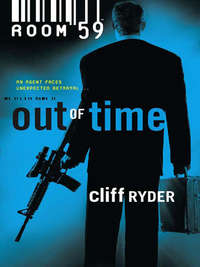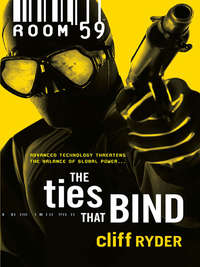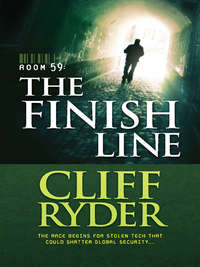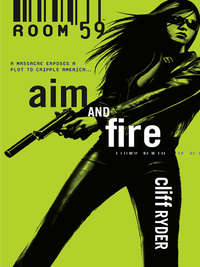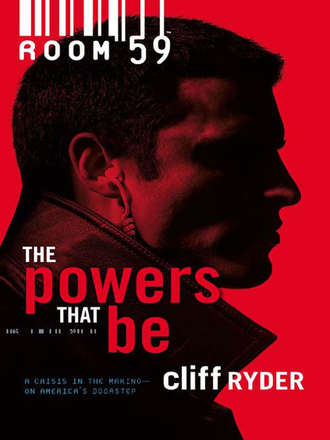
Полная версия
The Powers That Be
Jonas had expected Kate to bring this up, but his answer was ready nonetheless. “The current assignments can be routed to headquarters, and I will have up-to-date dossiers prepared on all of them before I leave.”
Kate glanced at her liaison. “Judy brings up a good point, however. I’m still having a difficult time reconciling the idea of assigning a department head to a field mission, leaving his ongoing missions in the lurch, possibly to be compromised. I have to think of what’s best for everyone, both here and in the field.”
“I have an idea.” Denny had been leafing through virtual operative dossiers while keeping one ear on the exchange. “I think I know who you want to put into this assignment on the Cuban end—Marcus Ruiz, right?”
“He was one of several candidates on my list. However, he just finished his current assignment and was supposed to have some downtime,” Kate replied.
“Yes, there is that, and also the rather explosive way that his last mission ended, even if it was successful. Perhaps it would be a good idea for him to go into the field again, this time under the eye of a more experienced man, learn a few techniques on covert operations. Get back on the horse, so to speak. I can think of only a few better men to learn from than Jonas,” Denny said.
Samantha frowned. “From what I read, he stated that the destruction of the warehouse wasn’t his fault, given the highly volatile chemicals stored there, as well as the sabotage by one of the drug dealers. Do you have doubts about Mr. Ruiz’s capability to handle himself? Given the sensitive nature of this mission, perhaps it would be best to go with someone new, perhaps already in place.”
Kate shook her head. “One, it sounds like there’s no time, and two, given the high levels of secret police and informants on the island, we wouldn’t know if we could trust anyone there. Regardless of his past performance, Marcus is an excellent choice. He’s an American-born Cuban, speaks the language with the proper accent and will blend in like a native, which is exactly what we want—someone who won’t arouse suspicion.”
Judy smiled tightly. “Very well. If Jonas can reroute or clear his schedule, and Denny, with your approval, as this still falls under your oversight, by the way—”
“Then let’s get to it,” the rangy Tennessean replied. “Jonas, let’s conference about setting up your identity after this.”
“Then it’s agreed,” Kate said. “Denny, please contact Marcus and offer my apologies, but I’m afraid we’ll need him to be ready to go in the next twelve hours. After this, however, he’ll receive the mandatory month off—he has my word. Jonas, looks like we’ll be seeing you stateside soon.”
“I’m looking forward to it.”
“Any other questions?” Kate asked.
“Just one more, if I may?” Jonas leaned forward. “The double agent on site—I assume it is the same one that we turned in Spain?”
“Correct. Is there anything else?” Kate rose from the table. “That’s all, people. Let’s get to work.”
Jonas cut the connection and slipped off the glasses, wincing at the slight headache they always gave him. He stared at the frozen Marine on the computer screen in front of him and, with a sigh, saved his progress on the program and turned it off.
He envied that young agent who would be heading to Cuba, for a moment even wishing he could take his place. And what do you think you would do then, old man? Charge over there and invade Cuba yourself? Maybe you should just let the past remain as the past and not go chasing old ghosts.
Jonas walked to the steel-and-glass bar on the other side of his living room and poured himself a drink—Maker’s Mark bourbon, his first and last of the day. As he swallowed the fiery liquid, he considered the real reasons for going over there.
I do have the knowledge and it’s extremely unlikely that any of the players would make me for anything other than who I’ll pretend to be. And even Denny said it was a good idea to keep an eye on this young agent, he told himself.
But as he drained the glass, he ignored the voice in the back of his mind that was quietly telling him it was all bullshit—that the reason he was putting himself in harm’s way again was entirely personal.
His cell phone chimed again, and Jonas looked at it for a moment, then shook off his doubts and got down to business. “Hello, Denny…Yes, it will be good to get back into the field again.”
5
With a huge yawn, Marcus Ruiz opened his eyes and reveled in the sensations all around him—a real bed and clean sheets, the aroma of frying ham and toasting bread from the kitchen below, the feel of his hair without weeks of sweat, oil and grease in it. Marcus rolled over and basked in the bright sunshine streaming in through the windows, one thought on his mind.
It’s good to be home.
After delivering Terry to his superiors for interrogation, Marcus hadn’t wasted a moment getting out of Montana on the first available flight to Florida. Along the way, he had been debriefed by Denny Talbot, and had taken some heat over the destruction of the warehouse and the meth lab evidence. Marcus had defended his work, saying, “Hey, it was six on one, and I still managed to get the guy out in one piece. Now, if you had told me you wanted the place intact, well, I would have done what I could, but you guys said get the link to Asia, which I did—alive—which I also did. Sorry if the locals are stuck sifting ashes. If they wanted to build a case against the Death Angels, someone should have told me. And by the way, the best news I can deliver is that gang won’t be pushing crystal meth on anyone for a long, long time.”
Denny had said that he would have to take up the mission’s parameters with his superiors, and Marcus had replied that he had to do what he had to do, but, “If there’s nothing else you need from me right now, I’m heading home.” Denny had assured him that he’d certainly earned some downtime and told him to enjoy it.
And now, twenty-two hours and three flight changes later, he was relaxing in his parents’ house in Little Havana, his rumbling stomach telling him it was time for some real food for a change. Not like the junk or fast food eaten on the run—when the gang had eaten at all. Marcus suspected he had lost about twelve pounds running with the meth-snorting Angels over the past eight weeks. Time to put some of that back on, he thought with a grin, rolling out of bed and heading for the shower. He had taken one when he had gotten in late last night, but wanted another, just to enjoy it.
Seven minutes later—his Army training still in full effect—dressed in loose cotton pants and a two-pocket guayabera shirt, Marcus ambled downstairs just in time to see his two younger brothers, wrestling in the living room, about to crash into the coffee table.
“¡Párese!” Without waiting to see if they would heed his command to stop, Marcus leaped forward to intercept the twins before they damaged themselves or the furniture. “¡Venga en! Mother has breakfast waiting.”
The trio trooped into the kitchen. The cheerful room was painted bright yellow with a pattern of blue-and-green curls decorating the walls. Marcus gazed around at the kitchen he had grown up in and where his parents were now raising another generation. They had planned on only having Marcus, but had been surprised with the twins a dozen years ago. Marcus suspected his father, Reynaldo, had secretly been pleased at his virility, as he doted on the boys, often mentioning his plans for them to join the family business.
Their mother, Maria, scolded them, her tone teasing as she delivered the piping-hot, traditional breakfast she always served when Marcus was home—tostadas, coquetas, rolls of ground pork and ham dipped in egg batter and fried until golden-brown and strong, sweet café con leche.
Marcus had two helpings of everything, then tipped his chair back and stifled a belch. “Gracias, Mama.” Even though he had his own apartment in the neighborhood, Marcus loved his family and always tried to spend as much time with them as possible, especially after a mission.
“Marcus, will you take us to the movies this afternoon?” Esteban pleaded. He was fascinated with the cinema, and was already making films in the backyard, intending to be the next Steven Spielberg or James Cameron.
His twin brother, Ismael, glared at him. “No, he doesn’t want to stay cooped up all day. We should go to the marina, see the speedboat exhibition.” A budding speedboat racer, he was as addicted to ESPN and other boating channels as his brother was to film. He could recite statistics on famous powerboat pilots, either current or past champions, with ease.
“All right, that’s enough from both of you.” Maria silenced the chattering boys with a raised finger. “Marcus has just gotten here. It’s not right for you to demand such things from him like this.”
“It’s all right, Mama, but I wanted to talk to Papa first.” Seeing her turn back to the sink, he waved at the boys to head outside and play. Clearing the table, he brought the stack of dishes to her. “How is the store doing?” His father ran the same neighborhood grocery store that he had founded when they had first arrived in America. Marcus had been born three months afterward, making him the first Ruiz to be a natural-born citizen.
“It seems all right, although he says that the big box stores keep cutting into his business and taking his workers, and he doesn’t know how he’s going to stay open if this continues.” She turned to face him. “I’ve told him that he needs to talk to the chamber of commerce about organizing some kind of referendum, but so far he hasn’t listened.” She turned away again, rattling dishes as she worked. “Oh, Marcus, you aren’t here to listen to me prattle on so.”
Marcus took his mother’s hand, warm and rough from years of housework, and brought it to his lips for a kiss that left the smell of lemon detergent in its wake. “Mama, that’s exactly why I come here, to talk to you. I’ll head over to see Papa a bit later, but first I’ll take the boys off your hands for the rest of the after—”
The shrill chime of his cell phone interrupted Marcus, and he glanced down in surprise. He shouldn’t have heard that tone for another twenty-nine days. He looked up to his mother’s face, who also recognized the sound, and now she took his hand, clasping it between hers. “Go on, answer it.”
He flipped the phone open. “Hello…Yes, sir…No, I’m available. It’s where?…All right, I’ll pick him up tomorrow afternoon…Yes, sir…It’s all right, but let her know I’ll hold her to that. Thank you, sir.”
He closed the phone and slowly replaced it in his pocket. For a moment, he stood there with his mother, neither of them saying anything. The chatter and shouts of the twins playing outside reached their ears.
“They need you again.”
It wasn’t a question. Marcus’s parents hadn’t been exactly thrilled when he had joined the Army, and less so when he had applied for the Ranger program. But they had learned to respect his passion for the military, and when he had taken this new job, which he described as “government consulting,” he knew his mother wasn’t naive enough to think it was simple travel and advising. But in their conversations, he had told her that this was what he wanted to do, to give something back to his homeland and their adopted country. Unfortunately, that also meant that there was only one answer he could give her.
He nodded.
“Oh, Marcus, you were gone so long this last time. You tell us not to worry, but I cannot help it—”
He put a finger to her lips. “I know, I know. They wouldn’t have asked if it wasn’t necessary. At least it shouldn’t be too long. They said perhaps five to seven days, so I’ll be back before you know it.”
“Do you have time to stop by the store and see your father? He would be upset if he didn’t see you before you left.”
Marcus had spoken with both his parents when he had first arrived, but he’d been so tired he didn’t remember much of the conversation. “Of course, Mama. I don’t actually start until tomorrow, so at least we’ll have this day together. I’ll be sure to spend some time with the boys, as well.” He walked to the door, then turned in the archway. “At least I’ll be doing something you always wanted for me this time.”
She frowned in confusion.
“I’m going back home.”
6
Major Damason Valdes sat alongside several soldiers from his brigade in a small, sweltering room, pressing headphones to his ears, straining to hear the hushed conversation in a room a few blocks away. He ignored the sweat, the smell and the restlessness of his men, concentrating instead on picking out the vital words that meant he and his unit could go in and do their job. While most other high-ranking officers in Cuba’s Revolutionary Armed Forces would have assigned this job to a sergeant, Damason was a firm believer in not ordering his men to any task that he wasn’t willing to oversee personally. As a result he’d wound up perspiring in a closed room, listening to a smuggling transaction at two in the morning.
Since the government had been forced to relax the strict sanctions against foreign trade and investment, Cuba had recovered somewhat from the crippling economic blow dealt to it by the breakup of the Soviet Union, their only benefactor since the early 1960s. However, with that inflow of trade had come side effects the country had been ill prepared for, such as an increase in crime. From street violence and robbery to drug and human trafficking, the police were hard-pressed to stem the sudden rise in illegal activity.
Well, they cannot do that and continue to monitor and report on our citizens at the same time with the efficiency the government demands, Damason thought sourly, wiping the sweat from his forehead. Since much of the military had also been reassigned to civilian business projects, he had come up with the idea of using his trained soldiers as an adjunct to the police force when necessary. Formed into handpicked units, the additional men had been paying dividends in the form of a marked decrease in overall crime in the areas they patrolled. But even now he faced rising lawlessness in areas not doubly patrolled, as if the criminals had learned of the combination of police and military, and simply set up shop elsewhere. His commander, General Alejandro Marino, was putting increasing pressure on him to not let the crime spill over into the high-profile tourist areas. The vice squads already had their hands full trying to contain the prostitution that had infiltrated the luxury resorts. If our great revolution would allow educated people to earn an honest wage, then our great leader wouldn’t have joked about the prostitutes having college degrees to that American filmmaker a few years ago, he thought bitterly.
Pressing the earphones tightly to his head, Damason heard the words he had been waiting for. “Here is the money—fifty thousand dollars. Now, let’s see the merchandise.”
What sounded like a cargo door of a panel truck was opened, the racket nearly deafening in his ears. He held his hand up, index finger pointing up, and felt all of his men straighten to attention. Pistols and rifles were quietly checked as he listened for the signal to begin the raid.
The small microphone he had cannibalized from a drug dealer’s karaoke machine last year transmitted the frightened whimpers of the “merchandise” the dealers were haggling over—women. They were to be transported to Mexico and used there or in the United States as sex slaves, then killed when their usefulness was at an end. The inhumanity made Damason’s blood boil. These men were dealing in human lives as casually as if they were selling cattle, inflicting degradation and suffering on hundreds, maybe even thousands of women. Until tonight.
Damason’s middle finger popped up next to his index. The deal was almost consummated. The money was fake, of course. Real dollars had to be pumped into Cuba’s flagging economy, to prop up the claims of excellent health care and free education, both of which were provided, but at a terrible cost.
Just when he was about to order his men to move out, a distant rattle caught his attention. It was the sound of another door opening, the garage door to the building. Shouts of “¡Policía!” and “¡No muévase!” rang in his ears.
“¡Mierda!” He yanked off the earphones. “That pig Gustavo went in too soon! Come on!” Drawing his .45, he yanked the slide back and led his men out the door and down the narrow alley to the crumbling building where the transaction was supposed to be taking place, berating himself for letting the police sergeant in on the raid in the first place. Damason knew how ruthless these slave traders were. He’d seen the report of them throwing their living cargo overboard when accosted by Cuban or U.S. Coast Guard patrols, hoping the ship would stop for the former captives and allowing them and the rest of the cargo to escape. And even now, as he led his men to the garage, he heard gunshots as the smugglers tried to blast their way out of the trap.
Damason assigned two men to head around the back to see if they could catch the thugs by surprise, while the rest of them took positions at the front of the building and readied their AK-47s. “The truck can only come out this way. Remember, if they try to escape, shoot only at the tires unless you have a clean shot at one of them. They’ll still have the women as hostages in the back.” It had gone ominously silent inside, with only a hanging light swinging crazily.
He pointed at two more of his men. “Take cover across the street at the corners and make sure that truck doesn’t leave.” To the other two men he said, “Follow me.”
Damason bent over and trotted to one side of the door, his two men right behind him. He smelled gunpowder and blood and heard a truck engine turning over. He ran to the other side of the closed door, then motioned his men to pull it open.
Headlights pierced the darkness as they did so, lighting up the alley as the truck rumbled forward. Automatic-weapons fire strobed the night as a man leaned out the passenger window, spraying bullets into the street. As the truck swerved into the narrow road, Damason stepped up onto the running board and slammed the butt of his pistol into the driver’s head. The man fell over, rendered unconscious by the blow. On the other side, the shooter slumped half out of the truck cab, his chest spouting blood from the gunfire of his men.
The truck, still in gear, lurched toward the other side of the street. The two men there ducked back into the alley as Damason wrenched the wheel to the left, turning the vehicle down the street with the barest scrape of a dented fender against the nearby building. He popped the door open and shoved the smuggler over, grabbing for the gearshift and kicking at the clutch to bring the truck to a stop before it plowed into something. With a screech of clashing gears, it shuddered to a stop in the middle of the street.
Damason turned off the engine, grabbed the motionless driver and dragged him out of the cab, handcuffing him. His men gathered around, and after Damason found keys on his prisoner, he assigned a soldier to guard the man and the rest to come with him to the back of the truck.
They unlocked the doors and opened them to reveal about two dozen women from the ages of fourteen to midtwenties, all dressed in filthy T-shirts and underwear and suffering from dehydration and heat stroke. The cargo area stank of sweat and feces, and Damason spotted a five-gallon bucket in the corner with a hole cut in the top. The majority seemed to be Cuban or Latin American, although there were a few Asian girls, and Damason saw a flash of red hair in the back, which meant at least one European or, heaven forbid, American was inside. They were all huddled together, staring dully at the fatigue-clothed men.
“Get water for these women,” he ordered. Two of his men trotted off. Damason turned to his second in command, a smart black sergeant named Elian Garcia Lopez. “Sergeant, make sure these women are given water and treated respectfully. Above all, they are not to be transported from here without my approval.”
“Sí, Major, it will be done.” Elian assigned one man to go in to talk to the women, leading them out one at a time, then began doling out water, cautioning the dazed women to drink slowly.
Another soldier ran up to Damason and saluted. “Major, Sergeant Lopez-Famosa y Fernandez wishes to see you inside.”
Damason stifled a sigh as he walked to the building. The police sergeant’s name wasn’t the only flowery thing about him. He was a preening cock of the walk perfumed with aromatic hair oil and aftershave at all times. The scent drifted around the room in a sickly-smelling cloud. That’s probably what gave them away—the smugglers smelled him coming, Damason thought.
He spied Fernandez standing with three other police officers near a prone form that immediately drew his attention. The sergeant prattled on about the good work, but Damason hardly heard him as he knelt next to the body.
The man who had volunteered to act as the buyer for the sting operation had been a quick-witted, genial young man. Santiago Cantara had seen his mandatory army service as a way to learn business skills that would help his family start their own venture someday. In the meantime, he had been the joker of the unit, and morale had soared when he had joined the men. Damason had to talk to him about becoming an officer, as he had possessed all of the skills the army was looking for. Now he was lying on the floor, dead.
Damason put his hand on the man’s chest, feeling the stillness of the body, knowing the heart inside would never beat again. He closed his eyes, trying to tamp down the rage coursing through him at this senseless tragedy. He swept the staring eyes shut and muttered a brief prayer over the body, not caring if anyone heard him. Then he stood and turned on his heel, fighting the urge to plant his fist in the oily sergeant’s face.
“An excellent job. Everyone will be commended in my report.” Sergeant Fernandez nodded with satisfaction.
“What happened to your man?” Damason’s voice was low and calm. Cantara had been paired with a veteran undercover police officer, who was nowhere to be found.
“Ah, Officer Garcia was wounded in the leg during the heroic struggle. He was taken to the nearest hospital and is being cared for now. Unfortunately, there was nothing that could be done for your man,” the police officer said.
Unfortunately? It should be you lying there in a pool of your own blood, you arrogant bastard! Damason fought to keep his thoughts to himself. He took a step toward the police sergeant, staring at him with his cold blue eyes, knowing his intense stare often unnerved those who weren’t used to it. “Why did you order your men to come in before my soldiers were in place?”
The slender, immaculately dressed sergeant didn’t quiver, but flicked an imaginary bit of dirt off his uniform lapel and shrugged. “We thought we heard a struggle, so we came hoping to stop these criminals before anyone was hurt.” He glanced down at the body and shook his head in feigned sympathy. “Alas, we were too late. When they saw us, they started shooting, and we had to defend ourselves. By the time it was over, I’m afraid your man was already dead.”
Damason knew the man was lying—whether it was for glory, or just, as he suspected, simple stupidity, the officer had bungled the raid, and one of his best men had paid the price.
“You did stop the truck, correct?” Fernandez asked, as if the reason for their mission had just occurred to him.
“Correct, and we captured the driver alive.” No thanks to you. “With a bit of persuasion, he should lead us to the group that supplies him with the women,” Damason said coldly.
“Excellent work, Major! I shall note your men’s bravery in my report, as well.” He strode to the door. “All that remains is to collect the women and make sure they are secure until preparations can be made to return them to their homes.” He turned to walk out of the room.
“My soldiers will help escort the women to a safehouse,” Damason said.


